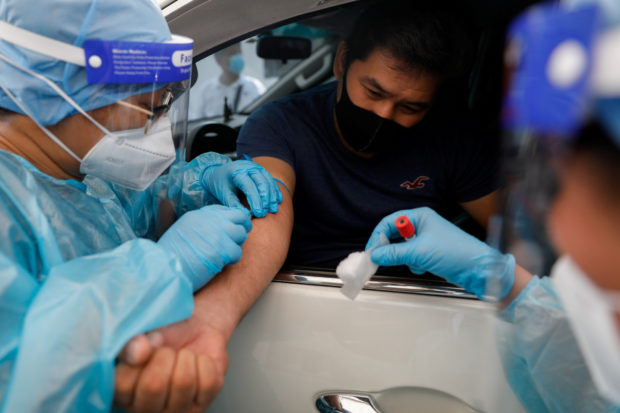DOH defends reduced quarantine for COVID-hit fully vaxxed health workers

FILE PHOTO: A healthcare worker takes a blood sample from a passenger at a coronavirus disease (COVID-19) drive-thru testing center in Manila, Philippines, on July 15, 2020. REUTERS/Eloisa Lopez/File Photo
MANILA, Philippines — The Department of Health (DOH) defended on Tuesday the government’s decision to shorten the period of isolation for fully vaccinated health workers infected with the new coronavirus or exposed to COVID-19 patients.
In an online media briefing, Vergeire assured that the government will not impose a policy that will put patients and health workers at risk. She also stressed that all policies of the government are based on science and evidence.
“Mayroon na pong ilang bansa na nagpatupad ng ganito ring protocol (There are countries already implementing this kind of protocol) because of contingencies, because of the high transmissibility of the Omicron variant. We would not want our health systems to be overwhelmed and nobody is going to take care of our patients,” she said.
“So ginawa po ito base sa siyensya at ebidensya. Wala pong balak ang ating gobyerno na mapunta sa at-risk ang ating mga pasyente at ating mga healthcare workers. Ito ay ginagawa base sa risk assessment ng mga hospital kung kakayanin at kung ito ay mas magiging beneficial para sa ating healthcare system at ating mga pasyente,” she added.
(So we decided on this based on science and evidence. The government does not want to put patients and healthcare workers at risk. This protocol is being done based on the risk assessment of hospitals if they can do this and if it will be beneficial for the healthcare system and our patients.)
Meanwhile, Dr. Anna Ong-Lim, chief of the Infectious and Tropical Disease of the Pediatrics Department at the University of the Philippines and a member of DOH’s Technical Advisory Group (TAG), said the review of quarantine protocols for health workers was made due to the “extreme need for essential workers.”
Like Vergeire, she stressed that the revised protocol was based on science.
“On review, ang nakikita natin ngayon ay ‘yung (what we are seeing now is the) characteristics ng (of the) virus that allow it to be more transmissible also come with features that allow for viral clearance to happen over a shorter period of time. So ‘yun ang pinagmumulan ng ating (that was the basis of the) shortened quarantine and isolation recommendations,” said Ong-Lim.
“Overall, what I would like to add is as an additional layer of safety, kahit pinaiksi natin ang duration, mayroon pa ring recommendations to continue masking especially kung humaharap tayo sa mga pasyente para makasiguro tayo na kung meron mang residual ay hindi pa rin tayo nakakapagtransmit,” she added.
(Overall, what I would like to add is as an additional layer of safety, even though we shortened the duration, we still have recommendations for masking especially if the health workers face patients so that we can make sure that if ever there is residual, the virus will not be transmitted.)
“These are all being done, balancing the new information coming from science as well as the need to provide care for our hospital patients,” the TAG member further noted.
For his part, Dr. Edsel Salvana, also a member of the DOH-TAG and director of the Institute of Molecular Biology and Biotechnology at the National Institutes of Health at the University of the Philippines – Manila, clarified that the infection control units of hospitals can still exercise discretion.
“Hindi naman po ito automatic, ‘yung protocols na ito. Mayroon pong discretion ang hospital infection control na siyang sumusuri ng risk. Hindi naman nila papapasukin ‘yan kung sa tingin nila na sobrang infectious talaga or makakasama,” he said.
(These protocols are not automatic. The hospital infection control units have the discretion to assess the risk. They will not allow the health worker to go on duty if they think he or she is still highly infectious.)
He said that some hospitals deploy health workers who went through shortened quarantines to COVID-19 wards to decrease the risk.
“It’s not an ideal situation, that’s why they are called a contingency or crisis modes, and as much as possible we would not want to invoke that,” said Salvana.
“But kung critical na po talaga na walang tao sa wards (if the situation is critical that there will be no one to man the wards), this is the time that the hospital infection control can invoke this as a last resort.”
He also said the DOH is augmenting the healthcare staff in some hospitals.
Hospital infection prevention and control committees and provincial health offices were earlier authorized to implement a shorter five-day isolation period for fully vaccinated healthcare workers who are COVID-19 positive but are asymptomatic or have mild to moderate symptoms.
Meanwhile, fully vaccinated healthcare workers who are close contacts of COVID-19 patients may no longer undergo quarantine.
But according to Vergeire, these hospital committees would have to make a thorough study before implementing the new protocols.
RELATED STORIES
IATF finds way to avert hospital staff shortage
COVID-19 isolation, quarantine periods for general population unchanged, DOH clarifies
Gov’t studying shortened COVID isolation, quarantine periods for fully vaccinated individuals
Group slams move to shorten isolation period for COVID-positive health workers
Villanueva: Shortened quarantine period for health workers a risky move
KGA
For more news about the novel coronavirus click here.
What you need to know about Coronavirus.
For more information on COVID-19, call the DOH Hotline: (02) 86517800 local 1149/1150.
The Inquirer Foundation supports our healthcare frontliners and is still accepting cash donations to be deposited at Banco de Oro (BDO) current account #007960018860 or donate through PayMaya using this link.